Atlantic Monthly Contributors's Blog, page 114
July 26, 2016
The Church Attack in France
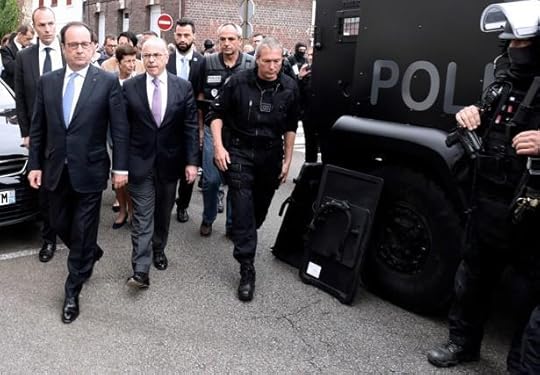
NEWS BRIEF Two knife-wielding men killed a priest and injured one other person in a church in northern France Tuesday, reportedly in the name of the Islamic State.
The attackers took at least four hostages at the church in Saint-Étienne-du-Rouvray, located in the Normandy region. Both men were killed by police after the standoff. President Francois Hollande quickly blamed ISIS, and the ISIS-affiliated Amaq news agency said the terrorist organization took credit for the attack, saying their soldiers had targeted the location in France because the country is part of “the crusader coalition.”
The identities of the attackers has not been released, but there are reports that at least one man was on a French terrorist watch list. As the BBC reported:
The selection of a church by the attackers, whatever their motives turn out to be, crosses a new red line in the grim history of recent attacks on continental Europe. The murder of an 84-year-old priest in this attack will have further inflamed public opinion.
News that one of the attackers was on the French government's terror watch-list, known as the S list, will prompt many to question its purpose if he can remain at large to carry a knife into a church.
The victim, the parish priest, was identified as Jacques Hamel. He was killed sometime before 10:50 a.m. local time, shortly after the church held Tuesday Mass. Within the hour the National Police told residents to stay clear of the scene, and had blocked off a security zone. By 11:15 a.m. police said the two men had been “neutralized.” A bomb squad has searched the church, and no explosives have been found.
Attendance at the church was low at the time of the attack because many people had left the city for summer holiday. The population of Saint-Étienne-du-Rouvray is about 28,000 people.
This is the fourth terrorist attack in France in less than two years. In January 2015, extremists shot and killed 17 people at the offices of the satirical newspaper Charlie Hebdo; in November of that year, ISIS assaulted a concert at the Bataclan, set off bombs near a soccer stadium, and shot people at restaurants, killing more than 130 people in about 20 minutes; earlier this month, a man drove a truck through a crowded street in Nice during Bastille Day, killing 84.

July 25, 2016
The Knife Attack in Japan

NEWS BRIEF A knife attack outside Tokyo has left at least 19 people dead and 20 more wounded, the AP reported Monday, citing Japanese media.
The attack occurred in the city of Sagamihara, located about 30 kilometers, or 20 miles, southwest of the Japanese capital. Reuters reported it occurred at a facility for disabled individuals, citing Kyodo news agency. Kyodo reported police have detained a suspect.
It is about 7 a.m. in Japan. This is a developing story, and we’ll update as we learn more.

The Health Risks of Pokémon Go

Since the release of Pokémon Go earlier this month, users in the United States, the United Kingdom, and New Zealand have gotten into car accidents, been robbed, and stumbled upon dead bodies in rivers, their attention compromised by the need to catch ’em all. The app has since been released in 38 countries, and some government officials appeared to have learned a thing or two from the experiences of the app’s first users.
France’s Minister of Social Affairs and Health Marisol Touraine issued a warning Monday in a tweet addressed to “all trainers,” encouraging Pokémon Go users to exercise caution while using the app. The app debuted in the country Sunday.
À tous les dresseurs : sortez, marchez, c'est bon pour la santé! Mais restez bien attentifs pour éviter l'accident. Bonne chasse! #PokemonGo
— Marisol Touraine (@MarisolTouraine) July 25, 2016
“To all the trainers: Go out, walking is good for your health! But be very attentive to avoid accidents. Happy hunting! #PokemonGo.”
To use Pokémon Go, players must physically wander around real-world locations in search of Pokémon characters. The app taps into a cellphone’s GPS and camera to make Pokémon “appear” against the backdrop of users’ surroundings as they move around. The physical component of the game has prompted many users to increase their overall physical activity, with early reports praising the game for its ability to encourage daily exercise.
But the app has taken users to some strange places, including cemeteries and strip clubs. Some locations have proven to be more dangerous than others; two men fell off an ocean bluff while attempting to catch a Pokémon in San Diego.
Several government officials and organizations in countries where the app is available have issued warnings about potential health hazards. Turkey’s health ministry advised users against playing the game during peak daylight hours in a Facebook post earlier this month, cautioning against too much sun exposure. The Israel Medical Association echoed similar warnings Sunday, advising users against playing the game between 10 a.m. and 4 p.m., and encouraging the use of sun protection. Japan’s National Center of Incident Readiness and Strategy for Cybersecurity released a nine-point flier with safety tips for players when the app went live last week.
In Bosnia, a nongovernmental agency warned citizens in a Facebook post of the dangers of playing the game in dangerous areas, citing the risk of players wandering onto old landmines that have existed since the 1992 Bosnian War.

Why Gay Marry?
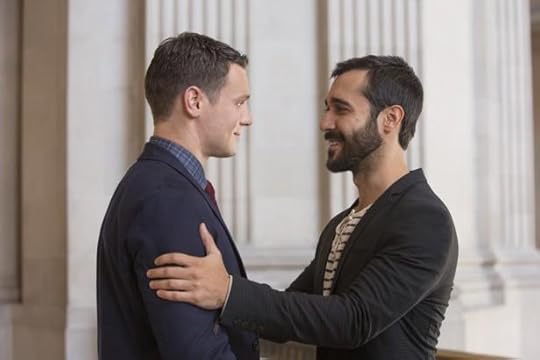
This post contains spoilers.
Early on in Looking: The Movie, the group of San Francisco gay men and allies who were chronicled for two seasons by the HBO series of the same name are at a bar celebrating an imminent wedding. No one can believe it’s Agustín, the flaky, hedonistic former artist of the group, who’s getting hitched.
“I think his exact words were, ‘I’d rather seal up my butthole and never suck another cock again than get married,’” an ex recalls.
Another friend, Dom, puts on a whiny voice of imitation: “I can't believe gay people are so desperate to be straight, they shouldn’t even be called gay anymore.”
Agustín retreats to sing karaoke.
The perceived conversion of a nonconformist into what one of the characters calls a “Stepford homo” sums up the underlying struggle that has defined Looking and, in fact, much of LGBT discourse in the 2000s. All along, HBO’s studiously chill depiction of gay-male hipsters has been a flashpoint for debates about whether previously transgressive aspects of queer life could or should survive wider social acceptance and the legalization of same-sex marriage. The fact that Looking closes, like so many a sitcom, with a wedding, would seem a conservative turn. But Sunday’s series-ending movie didn’t just graft gay people onto a straight trope. Rather, it provided a sustained and thoughtful consideration of what marriage might mean—for gay and straight alike—after Obergefell v. Hodges.
The previously bratty Agustín married Eddie, an HIV-positive bear who works a shelter for transgender teens, for a simple reason: They love each other and want to grow old together. This wasn’t some impulsive decision, Jessa-on-Girls style, and when Agustín suffered cold feet it was less for the classic fear of commitment and more out of a fear of betraying his identity. “I used to think I'd be like Keith Haring or Robert Mapplethorpe,” he said, “but instead I've become Neil Patrick Harris.”
Harring and Mapplethorpe were artists whose contributions were deeply bound to the reality of gay life as counterculture. Harris, meanwhile, is this era’s grinning icon of same-sex desire jibing with mainstream norms: getting married, being monogamous, raising children. Does Harris conform to those norms because of a desire to “assimilate,” or does he conform to them because they’re what works for him? Just as it would be presumptuous—and a judgement of all the gay people who had similar relationships before they were recognized by law—to assume the former is true, it would be silly to assume that wedlock will turn Agustín into a square. After resolving his crisis of conscience, he told his friend Patrick, “This marriage can be whatever we want it to be.”
“Exactly,” Patrick replied. “It's not like you're going to be suddenly monogamous and move to the suburbs."
If the straights aren’t getting married—marriage rates have hovered near their historic low for a few years now—why would the gays want to?
Eddie, too, had a bit of a freak-out before his wedding, but it seemed more tied to tradition and family expectations. The ceremony was to be a quick one at City Hall, in presence of a couple close friends (“maids of dishonor”). “I’m Italian for Chrissake,” Eddie stammered. “This is going to be the smallest Italian wedding in the history of time!" Agustín assured him that the ceremony is “just paperwork—we’re going to party tonight,” but it was clear that Eddie didn’t want to think of his marriage as totally punk—he’s willingly joining an institution with a history and social significance. Solution: Eddie’s mom Facetimed in for the ceremony.
But is Agustín right—is wedlock “just paperwork”? The political debate over gay marriage partly concerned the idea that it would de-emphasize marriage’s significance by further decoupling it from child rearing. Fascinatingly, Looking seemed to openly wonder whether that notion has come to pass. In the finale, the show’s one prominent straight couple, Doris and Malik, vowed to only ever “live in sin.” “Marriage is for the gays, and, poor fucking bastards, you can have it," Dorris said. Later in the episode, though, she revealed that she and her boyfriend are trying to have a child. They’d be unmarried parents, but that doesn't been they’d be uncommitted ones.
So if the straights aren’t getting married—and indeed marriage rates have hovered near their historic low for a few years now—why would the gays want to? For Agustín, formal recognition of his relationship comes across like a signpost of maturity, coinciding with him being able to (nearly) afford rent. Implied is the idea that for him and his friends, marriage is something you might choose to opt in to out of personal desire and circumstance; it’s not the near-mandatory endpoint that society once made it out to be for many straight people. In another fascinatingly ambivalent moment, the minister who joined Agustín and Eddie revealed that the wedding ring she wears is just for show—she’s not married. “Nobody wants a fat trainer at the gym,” she explained.
The other characters’ romantic story lines didn’t explicitly deal with marriage but did center on questions intrinsic to the demands of “till death do us part.” The cliffhanger that preceded this series finale came when Patrick moved in with his boss-turned-boyfriend Kevin to a high-end, gay-friendly apartment building—a symbol of the yuppification of same-sex relationships if there ever was one. But it became clear that the two men had different expectations around monogamy, with Patrick wanting exclusivity and Kevin assuming they’d entered into something more flexible. The series finale revealed that Patrick walked out on Kevin and moved back to his hometown of Denver. When they met up again over coffee, Kevin tore into Patrick for the breakup. “You quit, you run away, you don't take risks ever,” he ranted. “The risk would have been trying to make it work. The risk would have been putting in the hard graft to make it work.”
Similar statements about long-term relationships being noble struggles recurred throughout the movie (which, it must be said, is unfortunately both tidier and more didactic than the charming, naturalistic TV show that spawned it). In the end, Patrick began to rekindle things with another ex, Richie, after Richie fell out with his militantly liberal blogger boyfriend whose obnoxiousness may be another sign of Looking trying stake out a middle ground in gay politics. Another character, Dom, took himself out of the dating pool to focus on his job for a bit—a controversial decision among his friends, but one that recognizes how relationships take deep sacrifice.
But the most poignant moments were indeed around Agustín and Eddie, whose vows hinted at the reasons why society still formalizes relationships at all. “Do you promise to make the necessary adjustments in your personal and professional lives in order that you may live in a harmonious relationship together?” the minister asked them before an audience of dear friends. They said they do, and she pronounced them “partners in life” where “husband and wife” once only could have been.

An Encouraging New World for Superheroes
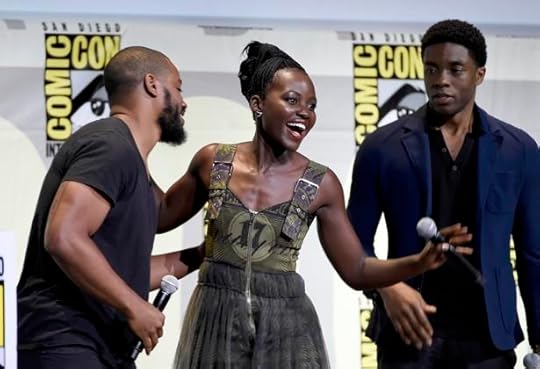
The pageantry of San Diego Comic-Con proceeds along the same lines every year: Big movie studios gather their stars together, and use them to pitch upcoming products to a friendly audience of dedicated fans, effectively rolling out the red carpet for the next year of blockbusters. As the long-range vision of superhero franchises like the Marvel Universe has become the norm, these press conferences have turned into sweeping proclamations of the future of Hollywood, laying out a studio’s next five years of movies with bullish confidence. They don’t always present the freshest vision, but at least this year, the future looked like it will finally bring some diverse faces to the big screen.
The “Marvel Cinematic Universe” has existed since 2008 and produced 13 movies so far, all of them starring white men, with four more coming before Black Panther (due out in February 2018) and Captain Marvel (March 2019). Even with the long wait ahead, those two movies were the hottest news from this year’s Comic-Con, and the official announcement of the Black Panther cast and crew was its most memorable moment, with the actors Chadwick Boseman, Michael B. Jordan, Lupita Nyong’o, and Danai Gurira joining the director Ryan Coogler on stage to hype the film. Progress in Hollywood is always painfully slow, but with their appearance—coupled with the diverse leads of Star Wars last year, the release of Ghostbusters, and Warner Brother’s first release of footage from Wonder Woman—there’s real evidence of change taking hold.
That’s especially important considering that Hollywood’s current business calibration is so heavy on the superheroes. Though Marvel has billions of dollars to show for its investment, its leading characters remain Captain America (Chris Evans), Thor (Chris Hemsworth), Iron Man (Robert Downey Jr.), the Hulk (Mark Ruffalo), and Guardians of the Galaxy’s Peter Quill (Chris Pratt), along with Black Widow (who has never been given her own film to star in). Over the next two years, the studio will roll out Spider-Man (played by Tom Holland), Doctor Strange (Benedict Cumberbatch), and further sequels to Thor and Guardians before getting to Black Panther (Boseman) and Captain Marvel (who will be played by Brie Larson, a piece of casting announced at Comic-Con).
“The superhero field is a field where there’s not a lot of representation,” Coogler told Entertainment Weekly at the convention. “It’s traditionally white male, but the fans look like the world. So, naturally, people are going to yearn to see someone flying around doing these incredible things that looks like them ... That’s what keeps me up at night—for better and for worse.” Coogler has already had a hand in reviving one major franchise with a lead of color, writing and directing Creed last year with Jordan playing a new protégé for the boxing champion Rocky (Sylvester Stallone).
In Black Panther, Jordan will play the villainous Erik Killmonger alongside Boseman’s King T’Challa, the leader of the fictional African country of Wakanda, who was introduced in the Marvel film Captain America: Civil War this year. Perhaps even more intriguing was the revelation that Nyong’o and Gurira would play members of a secret-service squad called Dora Milaje. “One of the most amazing things about Wakanda is they have these women who are the best fighters in the kingdom,” Coogler said. News of Captain Marvel was comparatively brief, as the film doesn’t even have a director assigned yet, but Larson (who won an Oscar this year for her performance in Room) is representative of the kind of A-list talent Marvel can now attract to its brand.
Competing for attention was Warner Bros., which is trying to build out a rival brand of superhero movies based on the heroes of DC Comics. Its efforts so far, including Man of Steel and Batman v Superman: Dawn of Justice, have largely faltered with critics, but in the long-range Hollywood economy, that hardly matters—such duds can be quickly buried by an upcoming wave of heroes. Footage from the 2017 team-up film Justice League focused heavily on humor, with some semi-sparkling banter between Batman (Ben Affleck) and The Flash (Ezra Miller), suggesting a welcome change from the gloom of previous entries in the franchise.
More exciting, though, was the first footage of Wonder Woman, inarguably the most famous female superhero in the history of comics. She’s existed since 1941, debuting only two years after Batman was created, but there have been nine feature films made about him in the intervening years, and none about her. Wonder Woman, directed by Patty Jenkins, comes to theaters in 2017 after decades of failed attempts. “It’s overdue, but it also feels like the best time in the world to make this movie,” Jenkins said. After years of fans clamoring for heroes that represent their viewing audience, her sentiment feels particularly apt.

Can Two Internet Relics Become Relevant?
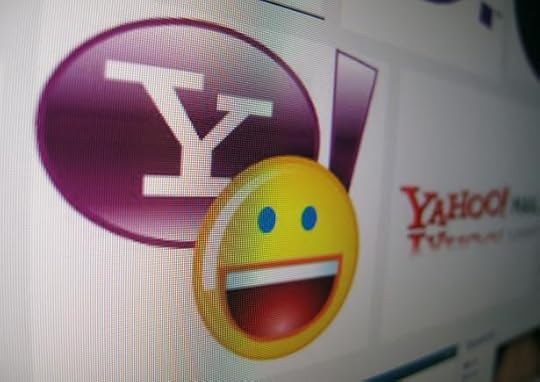
NEWS BRIEF Verizon has purchased Yahoo for $4.83 billion, 14 months after it bought AOL, another early internet giant, in hopes of meshing their technologies together to make a digital media company that can stay relevant.
Yahoo had once been valued at $125 billion, but in recent years has been called almost “worthless,” as my colleague Derek Thompson wrote in 2014. Yahoo became a leader on the web, providing popular messaging services, email, and a widely used search engine. But it failed to stay relevant against companies like Google, and it never successfully broke into the social-media realm with companies like Facebook.
The deal for Yahoo includes its news site, email, the Tumblr social network, and its online advertising division, among other assets. Verizon hopes that with its purchase of AOL last May for $4.4 billion, the combined technology from those two companies will allow it to take on top digital rivals, as The Wall Street Journal explained:
Verizon is building a portfolio of online content and aiming to monetize it via advertising. Its current assets include Huffington Post and TechCrunch, which it acquired in last year’s AOL deal, and its own mobile video app, called go90. Acquiring Yahoo will bring in millions more viewers from Yahoo sites like Finance, Sports and News.
Verizon also hopes to plug data derived from smartphones into AOL, and now Yahoo’s, digital advertising systems, and it is aiming to build a competitor to online advertising giants Facebook Inc. and AlphabetInc.’s Google.
Yahoo was created 22 years ago by two Stanford University graduate students in a trailer. In 1994, Jerry Yang and David Filo built a website called “Jerry and David’s guide to the world wide web,” which tried to make the vast internet a bit more navigable. They later renamed their site Yahoo, which stood for “Yet Another Hierarchically Organized Oracle.” For a while it was the internet’s homepage, and it is still ranked among the world’s top companies for online digital news visits. So while Yahoo has a large audience, AOL had developed online advertising tools, and together Verizon hopes it can make a play for more of the market.
But digital media is new territory for Verizon, and it will still have a tough time competing with Facebook and Google. Together, they make up half of U.S. digital advertising.

Erdogan vs. the Turkish Media
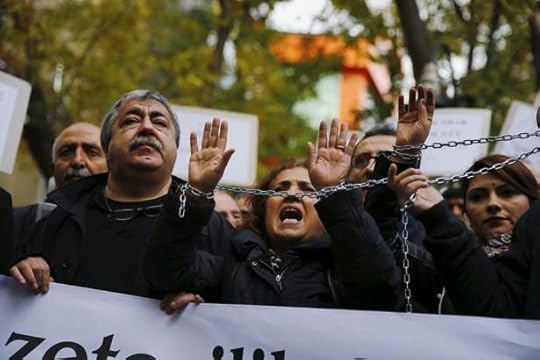
NEWS BRIEF Turkish police arrested 42 journalists Monday, including a popular commentator and a former parliament member, on suspicion of cooperating with the recent coup attempt that left hundreds head and the country’s leadership in limbo.
Since the July 15 putsch, President Recep Tayyip Erdogan has ordered the arrests of 13,000 people, including members of the military, police, academia, and judiciary. They can be held for up to 30 days before being charged with a crime. Erdogan ties them to the U.S.-based Muslim cleric Fethullah Gulen who he says orchestrated the coup attempt. Reuters explains:
In his first decree since the state of emergency was declared, Erdogan ordered the closure of thousands of private schools, charities and foundations with suspected links to Gulen, who denies involvement in the coup.
Gulen, who has lived in self-imposed exile in the United States since 1999, says the coup may have been orchestrated by Erdogan himself.
Erdogan’s recent actions, which include granting himself new powers to sign laws without parliamentary approval and considering the idea of reintroducing the death penalty, puts Turkey’s, and Erdogan’s, ambitions of joining the European Union at risk, something Turkey has been striving for years. EU Commission President Jean-Claude Juncker said Monday the country “is not in a position to become a member any time soon and not even over a longer period.”
These are far from the first arrests Erdogan has ordered for journalists. Since being elected president in 2014, there have been dozens of others, and some have been charged with espionage. As my colleague Krishnadev Calamur has reported, opposition newspapers have been seized and foreign journalists have been deported in Erdogan’s presidency, as well.

The Muscovite Candidate?

Sometimes a conspiracy theory can be true. Or, to put it another way, just because you’re paranoid doesn’t mean they aren’t out to get you.
Take the burgeoning email leaks scandal that hit the Democratic National Committee on Friday. A searchable cache of 20,000 emails showed up on WikiLeaks. The dump arrived about five weeks after the DNC announced it had been hacked. (Disclosure: I make a cameo in the cache when a staffer suggests my inventory of which Republicans are and aren’t backing Donald Trump “should be helpful.” And frankly, I agree it is. Please read it!) The dump has already claimed a major victim, Democratic National Committee Chair Debbie Wasserman Schultz, who announced on Sunday that she would step down after the party convention this week. Her already-minor role in the convention seems likely to shrink still further.
What’s in the emails? Aaron Blake has a good roundup at The Washington Post, but don’t expect much in the way of surprises. It doesn’t take private emails to know that the DNC wasn’t fond of Senator Bernie Sanders. (Nor is it all that shocking that party insiders favored the candidate who had longer-standing connections with them, and a powerful campaign apparatus, over an outside who only joined the Democratic Party on the eve of the campaign.)
More interesting is how the emails leaked out. When the leak occurred, the DNC and government officials said that Russian hackers were to blame. On Sunday, Clinton campaign manager Robby Mook went on ABC’s This Week and repeated the allegation.
“What's disturbing about this entire situation is that experts are telling us that Russian state actors broke into the DNC, took all these emails and now are leaking them out through these Web sites …. for the purpose of helping Donald Trump,” he said. Mook also questioned whether the emails had been “doctored.”
There’s a whiff of CYA to this line of argument, the type of pleading delivered by a DNC that’s been caught in a bad place. Mook’s question aside, there seem to be no serious cases where DNC employees have claimed their emails were altered. But just because Democrats seem to be looking for an excuse doesn’t mean their excuse isn’t valid.
The FBI said Monday morning that it is investigating the email leak, and there’s a stack of evidence connecting the leak to Russia, which DefenseOne’s Patrick Tucker helpfully rounds up. Thomas Rid has more at Motherboard. The New York Times suggests the question is not who did it, but on what authority: “Whether the thefts were ordered by Mr. Putin, or just carried out by apparatchiks who thought they might please him, is anyone’s guess.”
That all suggests a disturbing chain of events: Russian-government hackers worked their way into the Democratic Party’s email system, smuggled out what they wanted, and then delivered the cache to WikiLeaks right on the eve of the Democratic National Convention, and right after Donald Trump’s coronation at the Republican National Convention, to maximize the negative impact of the revelations. (A WikiLeaks tweet in which the organization gives itself a pat on the back can be read as an ironic commentary on a Putinist plot.) The Russian government, in other words, could be attempting to meddle with the results of the U.S. presidential election. As journalists who have covered Russia, as well as the top Democrat on the House Intelligence Committee, pointed out, such an action would be in line with previous Russian interference in foreign elections, most of them closer to home.
The Clinton campaign has already begun making a case that Donald Trump is not just sympathetic to, but actively in league with, Vladimir Putin. One candidate lodging such an allegation against another would be effectively unprecedented, the Times notes. (Foreign interference, however, might not be; nor, needless to say, is the U.S. innocent of meddling in foreign elections.) Michael Isikoff reports on how a consultant working for the DNC started getting frequent messages saying her account was being targeted by “state-sponsored actors” after she began investigating Trump campaign manager Paul Manafort, who previously worked for a Putin client. “Since I started digging into Manafort, these messages have been a daily occurrence on my Yahoo account despite changing my password often,” she wrote to a DNC employee.
Isikoff explains the importance of that revelation: It is “the first indication that the reach of the hackers who penetrated the DNC extended beyond the official email accounts of committee officials to include their private email and potentially the content on their smartphones.”
Setting the emails aside, my colleague Jeffrey Goldberg wrote last week, the idea of a Putin-Trump alliance isn’t easy to dismiss out of hand:
I am not suggesting that Donald Trump is employed by Putin—though his campaign manager, Paul Manafort, was for many years on the payroll of the Putin-backed former president of Ukraine, Viktor Yanukovych. I am arguing that Trump’s understanding of America’s role in the world aligns with Russia’s geostrategic interests; that his critique of American democracy is in accord with the Kremlin’s critique of American democracy; and that he shares numerous ideological and dispositional proclivities with Putin—for one thing, an obsession with the sort of “strength” often associated with dictators. Trump is making it clear that, as president, he would allow Russia to advance its hegemonic interests across Europe and the Middle East.
Whether or not the Russian government hacked and leaked the emails to harm Hillary Clinton, and even whether or not the Russian government had a role in the hack in the first place, the Kremlin’s interest in Trump’s success doesn’t require a great deal of sleuthing; it’s as plain as the policies he proposes.

The Deadly Explosion in Ansbach

NEWS BRIEF The Islamic State has claimed responsibility for a suicide attack in Germany Sunday night that wounded at least 15 people and forced the evacuation of about 2,000 people from the surrounding area.
The militant group said Monday it was behind the explosion in Ansbach, a town of about 40,000, according to Reuters and the AP. The attack occurred outside an open-air music festival in the town. The attacker, a 27-year-old from Syria who was denied asylum in Germany, detonated a backpack of explosives after he was turned away from the event because he did not have a ticket, the AP reported.
Officials have not named the attacker. Investigators found a video on his cellphone in which he pledged allegiance to Abu Bakr al-Baghdadi, the self-proclaimed leader of the terrorist organization. More on the attacker, from Reuters:
The 27-year-old arrived in Germany two years ago and claimed asylum, a federal interior ministry spokesman said. He had been in trouble with police repeatedly for drug-taking and other offences and faced deportation to Bulgaria.
The attack followed several incidents of violence against civilians in the Bavarian region. On Friday, an 18-year-old Iranian-German man shot and killed nine people near a shopping mall in Munich. On July 19, an teenage Afghan refugee wielded an axe and knife against passengers on a train in Wuerzburg, injuring four. German police say those attacks were not related to ISIS.

The Ultimate (Futile?) Statement Against Politicians Misusing Songs
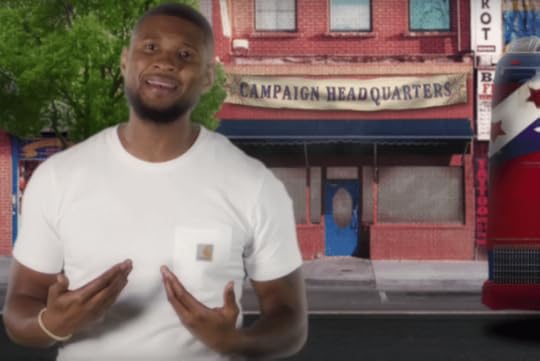
John Oliver has rounded up some famous singers for a song that, in a fair and just universe, might be the final statement anyone would need to make about the election-year tradition of musicians getting mad at politicians for using their music. Usher, Cyndi Lauper, Sheryl Crow, Josh Groban, John Mellencamp, Imagine Dragons, Heart, and Michael Bolton join forces in front of uber-patriotic backdrops, making “Don’t Use Our Song” into such a catchy refrain that it should remain lodged in the minds of all future political-convention DJs—though they still won’t in most cases be legally bound to obey:
Oliver’s intro riffs on the recent mini-controversies that have arisen from Donald Trump using Queen and REM songs at his events, but also makes clear just how long-running and widespread a trend it is for politicians on both sides of the aisle to annoy the music world with “unauthorized” campaign playlists. Bruce Springsteen’s “Born in the USA” is the canonical example, and in this new song Heart and Imagine Dragons’s Dan Reynolds team up for this couplet: “Why would Reagan be playin’ ‘Born in the USA’? It’s about Vietnam!”
The proudly hammy music video has a few fun zingers, including a dig at Spotify and a segment where a cat walks across a keyboard to provide a tune that politicians can use for free. But the most telling moment is when Usher says, “Don’t use our songs. That’s licensing. You gotta call my publisher.” The truth is that many of the times when musicians speak out about the use of their work in politics, the offending politician is in the clear, legally speaking. It usually depends on the venue: Somewhere like the Quicken Loans Arena, where the RNC happened, has likely already obtained a blanket license from performance-rights organizations, which allows the use of almost any song. If a venue doesn’t have a license, the campaign will usually obtain one.
Musicians have filed lawsuits over the matter, but public shaming may be their best recourse. When a song’s message or the facts of its creator’s life would seem to clearly contradict a politician’s message, pointing out the disconnect, like Springsteen did with Reagan, will often suffice. But when a musician just doesn’t like the politician using their music, the most they can normally do is make like the Dropkick Murphys, who tweeted to Scott Walker, “we literally hate you !!!” John Oliver’s music video is in that vein. In the face of campaigns who have obtained blanket licenses, “Don’t Use Our Songs” sends a blanket warning: Just because you can use a song doesn’t mean you should.

Atlantic Monthly Contributors's Blog
- Atlantic Monthly Contributors's profile
- 1 follower



